5 Health Sciences faculty members named 2024 Women of Impact
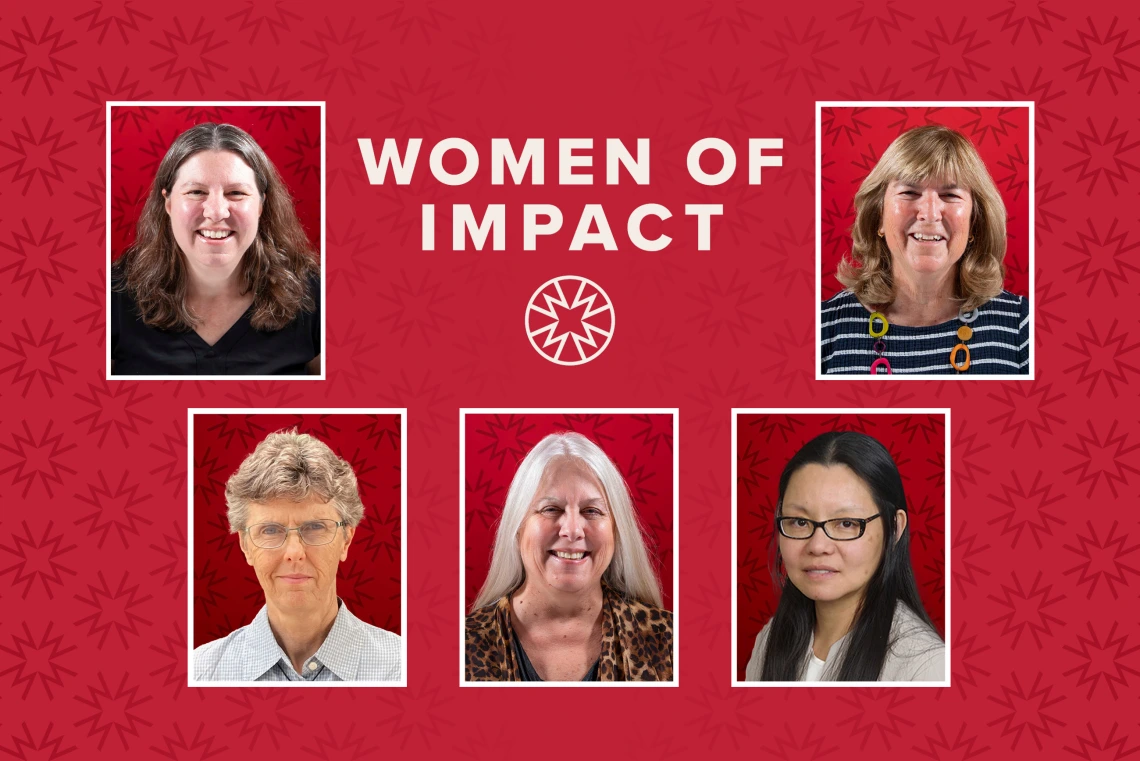
Five faculty members from the University of Arizona Health Sciences will receive University of Arizona Women of Impact Awards from the office of Research, Innovation and Impact on Nov. 7. Thirty-one faculty and staff members will be honored this year.
“The University of Arizona Health Sciences is proud to see so many deserving faculty and staff recognized with this award,” said Michael D. Dake, MD, senior vice president for Health Sciences. “These remarkable women exemplify the groundbreaking research and forward-thinking innovation happening every day on our campuses, as well as the commitment to empowering the next generation of health care providers to reach its fullest potential.”
Each year, RII solicits nominations from across the university for the award, ultimately selecting the “remarkable faculty and staff who have each contributed significantly to our identity as a world-class research enterprise,” as stated on its website. Awardees are selected based on their commitment to the University of Arizona's purpose, mission and values; their unique skills in driving discovery and innovation; and their community impact and willingness to empower others.
Members of the 2024 judging panel included five former awardees and a member of the U of A senior leadership team. About 100 women were nominated this year.
The five Health Sciences awardees are:
Erika Eggers, PhD
College of Medicine – Tucson associate department head for research and professor in the Department of Physiology; professor, BIO5 Institute; professor of Biomedical Engineering, College of Engineering
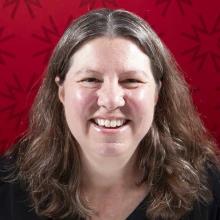
Erika Eggers, PhD
Eggers on the award: It is a great honor to be recognized among so many accomplished women. Being recognized as having a positive impact on the University of Arizona is very motivating for the times when research difficulties present themselves, as they always do.
The support for collaboration across my departments, colleges and the entire university has been essential to my success. My research has become increasingly interdisciplinary over the years, covering areas from neurophysiology, sensory physiology, diabetes, glial and vascular physiology, and neurodegenerative diseases. Being able to call on expertise from people all over the U of A Health Sciences has enhanced my research significantly and enabled me to work on projects I would not have imagined when I was a trainee.
A message to women entering health sciences professions: Don’t be afraid to follow your interests, even if they are in a field outside your original training. The fun part about an academic research career is being able to think about what projects are interesting and significant, and then finding ways to pursue them.
Lucinda (Cindy) Rankin, PhD
College of Medicine – Tucson associate professor (educator scholar); director, Physiology Honors Academy in the Department of Physiology; executive director, UAHS K-12 Health Literacy Project
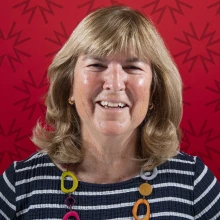
Lucinda (Cindy) Rankin, PhD
Rankin on the award: This award has highlighted the amazing people and students who have helped with, and benefitted from, the various programs that I’ve had a chance to envision and implement over my 40-plus years at the U of A.
Throughout my career, I have been fortunate to have department chairs, as well as supervisors and mentors, who have provided the avenues for implementing innovative programs and exploring new teaching approaches and classes to help meet the needs of not only our own majors but also nonmajors interested in learning about their bodies. What they learn will hopefully be carried around with them for the rest of their lives. This support for out-of-the-box thinking has yielded programs such as the Physiology Honors Academy, Physiology Ambassadors, PhysioWorks and the new Health Connectors program. It has also resulted in unique classes, such as those for freshman (“Tackling Physiology Issues”) or seniors (“Current Topics in Physiology”), that are contributing to the success of our students.
I have to say that teaching and mentoring students across all levels over the years has been an incredibly enjoyable and rewarding journey. Whether it be sharing the awe-inspiring world of how the body works with novices or helping a physiology student find and prepare for a best-fit career, this work keeps me on my toes and keeps me connected with an amazing array of people across the U of A and Southern Arizona communities, including those I get to work with as a board member of the Pima County Joint Technical Education District. This not only provides me with hope for future generations as potential educators, health care providers and scientists, but also as citizens.
A message to women entering health sciences professions: Seek an interdisciplinary network of mentors both within and outside of the health sciences arena. This small group of folks can provide different perspectives to help you navigate your own unique path to a successful and satisfying career, while also helping you face those inevitable challenges along the way.
Kathleen Rodgers, PhD
Associate director, translational neuroscience at the U of A Center for Innovation in Brain Science; professor of pharmacology at the U of A College of Medicine – Tucson; professor, BIO5 Institute
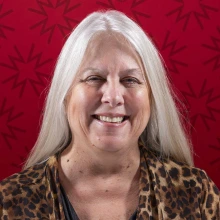
Kathleen Rodgers, PhD
Rodgers on the award: I am a bit overwhelmed by this honor. It represents a recognition of my contributions to the U of A, science and people’s lives. I am honored to have received this award.
The nature of open integrated research at the Center for Innovation in Brain Science under the leadership of Roberta Diaz Brinton, PhD, has been integral to my success at the U of A. The faculty and staff of CIBS provide amazing support that allows an immunologist to be successful in the development of novel therapeutics for neurodegenerative diseases. My academic department, Pharmacology, chaired by Todd Vanderah, PhD, has outstanding leadership. Overall, the collaborative nature of the university allowed me to immediately be a part of a greater community and supported my heart’s desire to improve opportunities for Native American students for graduate work in neurosciences and aging.
A message to women entering health sciences professions: My advice to young women entering health sciences professions is to find mentors early on who will be your advocates and cheerleaders and guide you through both exhilarating and stressful times of career development. Also, always take time to reflect and rejuvenate; this will make you a good scientist. Finally, stay true to your code of ethics, stay focused on objectives, and hold fast to family and friends.
Janet Roveda, PhD
Professor in the College of Nursing, BIO5 Institute, Biomedical Engineering, and Electrical and Computer Engineering
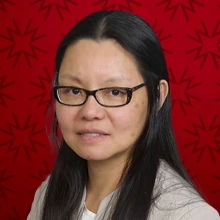
Janet Roveda, PhD
Roveda on the award: This is tremendous recognition! Thanks to my department head Michael Wu, PhD, and Distinguished Professor Jerzy Rozenblit, PhD, at the College of Engineering for their recommendations and nominations. I also want to thank David Hahn, PhD, dean of the College of Engineering, who has encouraged me to help and support communities in need.
I am also grateful for the support of Professor Shu Fen Wung, PhD, RN, director of Nursing-Engineering Initiatives at the College of Nursing, who has been an ardent supporter and mentored me in the field of nursing. I also was lucky to work with the dean of the College of Nursing, Brian Ahn, PhD, whose vision and inspiration provided me with great direction. Both Ahn and Wung have supported me in achieving my goals in the field of digital health research.
A message to women entering health sciences professions: Be open to new innovations and technologies and never give up.
Lisa Shubitz, DVM
Research scientist at the College of Medicine – Tucson’s Valley Fever Center for Excellence
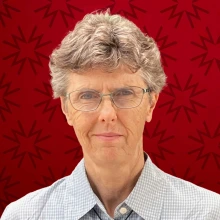
Lisa Shubitz, DVM
Shubitz on the award: I am humbled and honored to have been nominated by my colleagues for this award and to be selected as a Woman of Impact at the University of Arizona. I would not be here today without others — collaborators, friends who encouraged me, and people with vast knowledge and wisdom who inspired me in so many ways. I stand on the shoulders of giants, many of them unsung heroes.
U of A Health Sciences moved me from a primary position in my adjunct department, Animal and Comparative Biomedical Sciences, in 2016, which provided a closer relationship with my immediate colleagues in the Valley Fever Center for Excellence and spurred a rash of ideas and innovations. The center has also supported and encouraged my community outreach to veterinarians and pet owners, which has led to a wide variety of clinical research that benefits animals. This preliminary data led to the development of a vaccine to prevent canine, and next human, Valley fever, and generally improved evidence-based care of Valley fever in veterinary species. These activities help to connect the U of A and U of A Health Sciences to the Arizona community across the state.
A message to women entering health sciences professions: My advice for women entering health sciences professions is that you belong here. You can grow in so many directions — clinical, research, public health, bridging gaps between research and applied health care — that you will never be bored. You will discover a niche for yourself to make a difference for others and find fulfillment in your career and in your soul.

